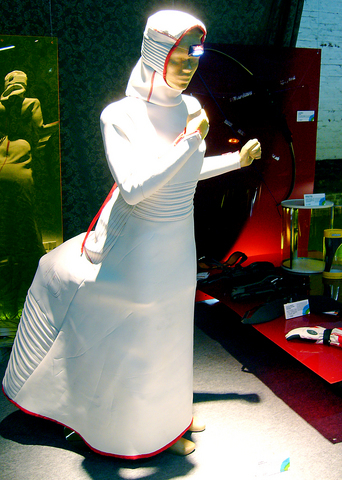For readers in the Kaohsiung area looking to fill their apartments with stuff they really don't need but feel they should have anyway, a visit to 2005 Taiwan Design Expo (台灣設計傳覽會) is in order.
The expo runs until Oct. 30 at the city's Wei Wu Military Camp
Co-sponsored by the Kaohsiung County Government this year's event focuses on everyday household products under the theme "Discover the New Home in Asia." Divided into five categories, the expo introduces a smorgasbord of new designs ranging from furniture to kitchen utensils and children's playthings.

PHOTO: GAVIN PHIPPS, TAIPEI TIMES
Those looking to spend their hard-earned cash on stuff that looks nice but that one can live without or, as the official English language guide puts it: "[to] learn creative esthetics of living up your life and building a [perfect] home."
From innovative and, admittedly, quite comfortable bamboo and wickerwork furniture, to two-person bathtubs, the expo features just about every conceivable form of product design. Some of the objects are already on the market, some of them are manufactured to order and others are, well, simply so batty that it makes you wonder why anybody would get paid to design them let alone why anybody would possibly want to buy them.
Visitors can wonder through the long disused military base's barracks and take in the contents of over a dozen specially designed pavilions.
"The Future Pavilion" predictably enough features futuristic designs for furniture and household objects, many of which look like they've come straight off the 1960s sci-fi TV series Space 1999.
The most interesting of the pavilions is the one dedicated to international design. The wide array of oddball household objects on display here includes ergonomic oven gloves that resemble flippers, a tubular cognac bottle that looks like it belongs on the International Space Station, gaudy 1970s-styled plastic tea pots and tea sets that wouldn't look out of place on an episode of the Brady Bunch.
The most inane of the lot, however, is the French-designed wedding dress that doubles as all-purpose sportswear and allows any modern bride the freedom to go for a quick jog before saying "I do."
The wildest pavilions are the "The Green" and "Home Forest" pavilions, which are filled with over-the-top bamboo structures designed to transform living spaces into urban
jungle-like environments.
Along with showcasing the oddball human aspects of modern design the expo also features a special area dedicated to pets. Here visitors can see outrageous designs for "pet houses" for dogs, cats and even hamsters. It's pretty inane, but it does make for an interesting and certainly mind opening visit.
Performance notes:
What: Taiwan Design Expo 2005
Where: Wei Wu Military Camp, Nanking Rd, Fangshan City, Kaohsiung County
When: Until Oct. 30.

In the March 9 edition of the Taipei Times a piece by Ninon Godefroy ran with the headine “The quiet, gentle rhythm of Taiwan.” It started with the line “Taiwan is a small, humble place. There is no Eiffel Tower, no pyramids — no singular attraction that draws the world’s attention.” I laughed out loud at that. This was out of no disrespect for the author or the piece, which made some interesting analogies and good points about how both Din Tai Fung’s and Taiwan Semiconductor Manufacturing Co’s (TSMC, 台積電) meticulous attention to detail and quality are not quite up to

April 21 to April 27 Hsieh Er’s (謝娥) political fortunes were rising fast after she got out of jail and joined the Chinese Nationalist Party (KMT) in December 1945. Not only did she hold key positions in various committees, she was elected the only woman on the Taipei City Council and headed to Nanjing in 1946 as the sole Taiwanese female representative to the National Constituent Assembly. With the support of first lady Soong May-ling (宋美齡), she started the Taipei Women’s Association and Taiwan Provincial Women’s Association, where she

Chinese Nationalist Party (KMT) Chairman Eric Chu (朱立倫) hatched a bold plan to charge forward and seize the initiative when he held a protest in front of the Taipei City Prosecutors’ Office. Though risky, because illegal, its success would help tackle at least six problems facing both himself and the KMT. What he did not see coming was Taipei Mayor Chiang Wan-an (將萬安) tripping him up out of the gate. In spite of Chu being the most consequential and successful KMT chairman since the early 2010s — arguably saving the party from financial ruin and restoring its electoral viability —

It is one of the more remarkable facts of Taiwan history that it was never occupied or claimed by any of the numerous kingdoms of southern China — Han or otherwise — that lay just across the water from it. None of their brilliant ministers ever discovered that Taiwan was a “core interest” of the state whose annexation was “inevitable.” As Paul Kua notes in an excellent monograph laying out how the Portuguese gave Taiwan the name “Formosa,” the first Europeans to express an interest in occupying Taiwan were the Spanish. Tonio Andrade in his seminal work, How Taiwan Became Chinese,